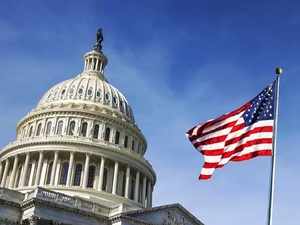 Agencies
AgenciesChina is the post-pandemic issue Trump is using to boost his chances in an election year. The trade and tariff war with China he triggered last year was Trump's stepping stone in an election year once Covid-19 struck and the dragon country became the source of the outbreak. His run-ins with China since then have taken on a messianic hue.
The latest in the attempts is the "Holding Foreign Companies Accountable Act'' Bill. The US Senate unanimously passed the bill aimed at delisting foreign companies not abiding by American accounting laws from the stock exchanges. Needless to say, the focus is on Chinese companies.
The promoters managed to rope in both sides of the political specturm to pilot the bill. Republican Senator John Kennedy joined hands with Democrat Chris Van Hollen to what they call protecting US investors and their retirement savings from foreign companies. Companies which flout the Securities and Exchange Commision oversight qualify for delisting. Bloomberg says the axe may fall on around 800 Chinese companies as and when the Bill becomes law.
Senator Van Hollen is quoted as saying: “For too long, Chinese companies have disregarded US reporting standards, misleading our investors. Publicly listed companies should all be held to the same standards, and this bill makes common sense changes to level the playing field and give investors the transparency they need to make informed decisions.”
The run-up to the Bill was not without impact. Well-known Chinese search engine Baidu, CNBC reported last week, is toying with the idea of delisting from Nasdaq and shift to an exchange closer home. A Reuters repport said Baidu is at present assessing the merits of the move which is said to be voluntary. Reuters reorted: "The company pointed to comments by co-founder and Chief Executive Robin Li who told the state-controlled China Daily on Thursday that Baidu was paying close attention to the tighter U.S. scrutiny of Chinese companies listed in the country. 'For a good company, there are many choices of destinations for listing, not limited to the U.S.,' he told the newspaper."
A more direct intervention from the President related to Thrift Saving Plan, an American retirement fund for federal employees and services personnel. The board handling investment plans of the body was told by the US labour department to stop proceeding with investing in "risky companies that pose a threat to US national security". Apparently, the reference is to Chinese companies.
Related reportage suggests that US Nasdaq is on the verge of making new rules that Chinese companies will find tough complying with in order to get listed on the stock exchange. A media report says: "Its proposals would mean companies from certain nations would have to raise at least $25m (£14.4m) or a quarter of their post-listing valuation to list. Tougher accounting rules will also apply for listings, which are called Initial Public Offerings (IPOs)."
American industry would not mind reducing dependence on China. The figures from the website of the Office of the United States Trade Representative tell the story. US goods and services trade with China totaled an estimated $737.1 billion in 2018. Exports were $179.3 billion; imports were $557.9 billion. The US goods and services trade deficit with China was $378.6 billion in 2018. US goods imports from China were up 6.7 per cent from 2017, and up 59.7 per cent from 2008. American imports from China account for 21.2 per cent of overall US imports in 2018.
The consequences are another matter, considering this is the election year.
Media reports are already out about how both Republicans and Democrats are vying with each other, even joining hands, to come up with Bills to reduce American imports from China. The figure for 2019 is said to be a whopping 18 per cent of the overall imports of the US.
Reuters last week reported, “Coronavirus has been a painful wakeup call that we are too reliant on nations like China for critical medical supplies,” said U.S. Senator Lindsey Graham in a press release on Friday. He is expected to issue a new bill this week.
Senator Graham is the one who in early May introduced "The COVID-19 Accountability Act"' to empower President Trump to impose sanctions on China if it does not provide to the US the hows and whys of the outbreak and spread of Covid- 19.
Powerful Congressman Jim Banks, member of the House Armed Services Committee, came up wtih the Restricting Predatory Acquisition During Covid-19 Act. It proposes to review purchases made during the lock down by companies with links to the Chinese Communist Party.
Another Bill, authored by Congressman Sharice Davids wants United States to immediately promote manufactuing of medical equipment like face masks, hospital gowns, ventilators and testing materials and stop their import from China.
Republican Senator Marco Rubio introduced a bill early May, proposing to ban sale of sensitive goods to China. It also wants American companies to pay higher taxes for incomes emanating from China.
Download The Economic Times News App to get Daily Market Updates & Live Business News.
Subscribe to The Economic Times Prime and read the ET ePaper online.
Read More News on
Download The Economic Times News App to get Daily Market Updates & Live Business News.
Subscribe to The Economic Times Prime and read the ET ePaper online.









 Get Unlimited Access to The Economic Times
Get Unlimited Access to The Economic Times
